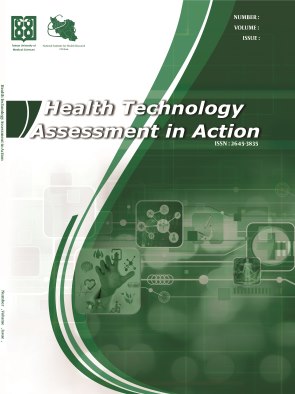Investigating the Status of Components of Educational Ethical Values Among Students of Southeastern Universities of Iran
Abstract
Abstract
Background: Undoubtedly, ethical and ethical values play a significant role in directing any field of behavior and activity in which a person engages. Students are confronted with different situations and demands in the university environment, necessitating different ethical and immorality behaviors.
Objectives: This study aimed to evaluate the components of ethical values among students at Zahedan universities.
Methods: In this descriptive-analytical cross-sectional study, 426 students were selected by stratified random sampling from Islamic Azad University, Sistan and Baluchestan University, and Medical Sciences University. Data were collected through a researcher-made questionnaire after calculating validity and reliability on four components: Academic honesty, academic dishonesty, research honesty, and research dishonesty. Data were analyzed using SPSS23 software with a one-sample t-test and MANOVA.
Results: From the perspective of students of different universities in Zahedan, the mean academic honesty, research honesty, academic dishonesty, and research dishonesty among students were less than the desired level. There was no significant difference between male and female students’ views on the mean of ethical value components among students. However, there was a significant difference between students’ views in different departments and universities about the average components of ethical value among students.
Conclusions: Considering the low average of scientific and research honesty among students relative to the desired limit and the significance of this difference, we need to increase students’ awareness of ethical values, observe justice and practical implementation of examples of ethical values by professors, and encourage individuals to adhere to ethical values.
1. Horner J. Ethicality, ethics, and law: introductory concepts. Seminars in speech and language. 2003;24(4):263-74.
2. Thomas JL, Vitell SJ, Gilbert FW, Rose GM. The impact of ethical cues on customer satisfaction with service. Journal of Retailing. 2002;78(3):167-73.
3. Valentine S, Godkin L, Lucero M. Ethical Context, Organizational Commitment, and Person-Organization Fit. Journal of Business Ethics. 2002;41(4):349-60.
4. Kalantari Ghazvini S, Ghoorchian N, Arasteh H, Mohammad Davoodi AH. Identifying TheAspects And Components Of Student's Ethics. Culture In The Islamic University. 2017;7(2 (23) #E0075):-.
5. Zeraati S, Reje N, Ahmadi Vash T, Davati A. A Study Of Ethical Intelligence Of Medical Students. Medical Ethics. 2014;8(27):-.
6. Hosseini Nejad SM, Sanagoo A, Kalantari S, Joybari L, Saeidi S. Educational Ethics In Academic Environment: Medical Students' Perspectives. Journal Of Medical Education Development. 2016;9(22):-.
7. Zali A. The evolution of medical ethics education. The Quarterly Of Medical Ethics. 2008;1:11-26.
8. Mulisa F. The Prevalence of Academic Dishonesty and Perceptions of Students towards its Practical Habits: Implication for Quality of Education. Science, Technology and Arts Research Journal. 2016;4:309.
9. Hofmann B, Bredahl Jensen L, Eriksen MB, Helgesson G, Juth N, Holm S. Research Integrity Among PhD Students at the Faculty of Medicine: A Comparison of Three Scandinavian Universities. Journal of empirical research on human research ethics : JERHRE. 2020;15(4):320-9.
10. hammati r, KARIMI S, ZAMANI BE. Unethical Behavior among Graduate Students. ETHICS IN SCIENCE & TECHNOLOGY. 2017;12(2 #r00778):-.
11. Khamesan A, Amiri MA. The Study Of Academic Cheating Among Male And Female Students. Ethics In Science & Technology. 2011;6(1):-.
12. Hofmann B, Myhr AI, Holm S. Scientific dishonesty—a nationwide survey of doctoral students in Norway. BMC Medical Ethics. 2013;14(1):3.
13. jahani j, Mohamadi M, Shahabinia F, shafiei m, Marzoghi R. Designing Content model of Ethical CompetenciesEducation to Students in Higher Education System. Journal of higher education curriculum studies. 2021;12(23):287-319.
14. Nakhaei N, Nikpour H. Investigation Of Medical Students' Opinions On Research Fraud In Thesis And Its Frequency. Strides In Development Of Medical Education. 2005;2(1):-.
15. ETEMAAD J, Dabagh H, Jookar B, HOSSEIN CHARI M. Investigating Shame: A comparison between the Freudian psychoanalysis and cognitive approach in psychology and a theological-ethical view about shame. JOURNAL OF PHILOSOPHICAL MEDITATIONS. 2018;8(20 #a001229):-.
16. Nazir MS, Aslam S. Academic Dishonesty and Perceptions of Pakistani Students. International Journal of Educational Management. 2010;24:655-68.
17. Wideman M. Academic Dishonesty in Postsecondary Education: A literature review. 2008.
18. Teixeira AAC, Rocha MF. Academic Cheating in Austria, Portugal, Romania and Spain: A Comparative Analysis. Research in Comparative and International Education. 2006;1(3):198-209.
19. Keyvanara M, Ojaghi R, CheshmehsohrabiM, Papi A. Experiences of experts about the instances of plagiarism. Journal of education and health promotion. 2013;2:32.
20. Mojtahedzade V, Asna Ashari H, Robatmili M. The Role of Ethics in Accounting and Accounting Education Challenges. Journal of Accounting and Social Interests. 2014;4(2):157-79.
| Files | ||
| Issue | Vol 6, No 1 (2022) | |
| Section | Articles | |
| DOI | https://doi.org/10.18502/htaa.v6i1.11133 | |
| Keywords | ||
| Keywords: Ethicality research honesty academic honesty research dishonesty academic dishonesty. | ||
| Rights and permissions | |

|
This work is licensed under a Creative Commons Attribution-NonCommercial 4.0 International License. |




